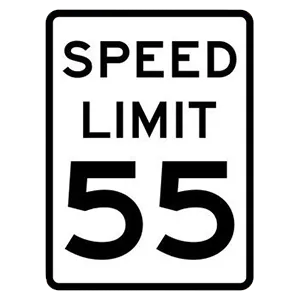Motorcycle Test | License NJ 2026 | FREE Online Practice! #1 Page 6 of 7
Take this FREE motorcycle test (license in NJ 2026) to check your knowledge of the road rules. To improve your results, download a motorcycle handbook online, study theory, and practice for free on our website. Still worried about how to get a motorcycle license in New Jersey in 2026? Check our website for more sample tests, train as much as possible, and boost your grades!
36 . This road sign means:

This is a speed limit sign. It indicates the maximum legal speed that you may drive on the road where it is posted. At times of rain, snow, ice, or other less-than-ideal conditions, you may have to drive more slowly than the posted limit.
37 . Maintain an adequate following distance behind other vehicles:
Maintaining an adequate following distance ensures that you will have enough space to stop or swerve out of the way if the vehicle ahead of you stops suddenly. A space cushion also provides you with a better view of any hazards on the road surface, such as potholes.
38 . Before carrying a passenger in traffic for the first time, you should:
Before transporting a passenger or heavy load in traffic for the first time, practice riding on a quiet road to get used to how your motorcycle handles differently with the additional weight.
39 . If you are riding and your motorcycle starts to handle differently, you should:
A sudden change in handling may indicate that a tire on your motorcycle has failed. If you feel a change in the way your motorcycle handles, pull over safely and check your tires.
40 . When riding in a group, inexperienced riders should ride:
When riding in a group, inexperienced riders should ride just behind the leader near the front of the group. This allows more experienced riders to keep an eye on them from the back of the group.
41 . Motorcycle riders should not rely on their mirrors to see what’s going on around them because:
Motorcycles, like any other vehicle, have blind spots. Therefore, you cannot rely only on your mirrors to know what is happening behind you. Frequent head checks should be part of your normal routine.
42 . When riding in a group, it is best to put inexperienced riders near the front because:
In a group, less experienced riders should ride toward the front, just behind the leader, so more experienced riders can easily watch them.
See the exact questions that will be on the 2026 New Jersey DMV exam.
99.2% of people who use the cheat sheet pass the FIRST TIME
Jeneen was tired of paying $5/gallon. She got herself a scooter that required the motorcycle license. She studyed the motorcycle test cheat sheet and passed her test the next day!
Christopher tells us how he knew nothing prior to obtaining the motorcycle study guide, and he only got one question wrong because he clicked on the wrong answer by mistake.



